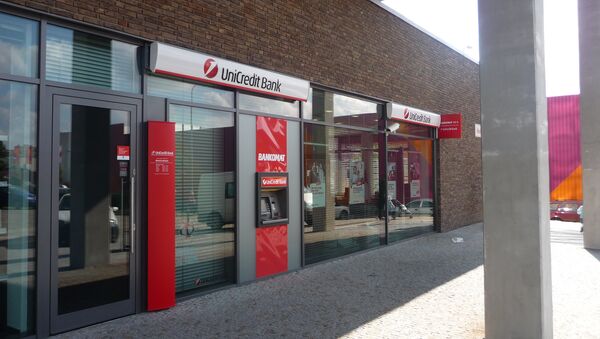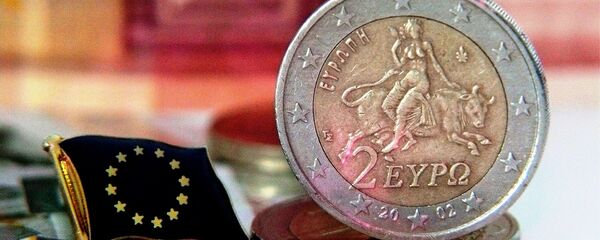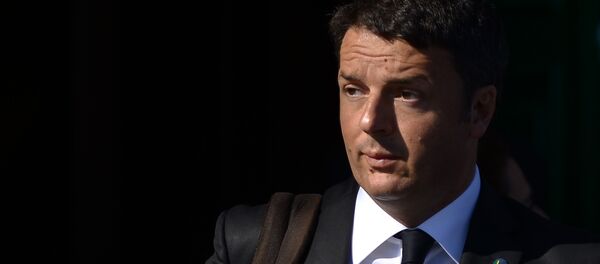The problems in the European banking sector have accumulated over a long period of time; the Brexit referendum gave another powerful impulse, said RIA Novosti analyst Dmitry Dobrov. The referendum sowed panic among foreign investors and undermined confidence in the financial markets. Under these conditions, investors are afraid to invest money in all countries with weak economies, including Italy. That is why Italian banks were affected by the crisis in the first place.
What's Happening to Italian Banks?
The Italian banking sector has about 360 billion euros of "bad" shares, which is about 20% of the total loan portfolio. About 200 billion euros of those are "irretrievably bad," said Dobrov. The course of shares of Italian banks has fallen by more than half since the beginning of the year, and this aggravates the situation even more.
The collapse of one bank may lead to a chain reaction that would have catastrophic financial and political consequences, not only for Italy but also all over Europe.
The oldest Italian bank, Monte dei Paschi di Siena, is on the verge of bankruptcy, the expert said. The absolute amount of the bank's "bad" loans amounted to 47 billion euros, which is more than 40% of the loan portfolio. Monte dei Paschi di Siena is not an isolated case; there are dozens of such financial institutions in Italy.
What to Do?
The government of Matteo Renzi seeks a review of Eurozone banking regulations in order to direct the taxpayers' money to save the bank. Renzi cannot allow depreciation or curtailment of bank deposits of Italians — and that is exactly what the new EU financial rules provide.
According to Dobrov, this action could lead to panic: investors will withdraw funds en masse from banks, and this will lead to a total collapse of the financial system. In the event of mass protests, early elections will be appointed, which could end in Italy's anti-European party coming to power.
German and French bankers are supporting Renzi: the government must participate in rescuing the bank. According to a leading economist at Deutsche Bank, help in the amount of 150 billion euros from the European Central Bank could save the situation. It would plug the holes in the European banking system, especially in Italy.
This action would allow the attraction of public funds as an exceptional measure, though in violation of EU banking rules. This refers to the common European solution that in the event of a bank's collapse the responsibility falls on its shareholders and investors, not taxpayers (or the state). But now banks demand the state to pay as well.
The Reaction of Germany and the IMF
Germany and its ruling parties are strongly opposed to Renzi's plans to use public money to rescue Italian banks. They called the Italian government's plans "unacceptable" and accused it of not planning accordingly after the negative bank stress tests in 2014. Such decision jeopardizes the stability of the whole monetary union, they continued.
Meanwhile, the IMF, which fears the crisis could spread to other euro zone countries, took on the side of Renzi. The Fund urged Rome to reorganize its banks as soon as possible. In its statement, the IMF stated that "the reform of the Italian financial sector is crucial for the recovery of the Eurozone's stability."
Now the Italian government is holding tough negotiations with Brussels and Frankfurt. There have been signals that the European Central Bank could provide some assistance on the condition that bank investors allocate money as well; but there is no single word on state support. A compromise on the Greek scenario is not ruled out, too, Dmitry Dobrov said. The state could be allowed to buy back shares of Monte dei Paschi, but the European Commission in response will force investors to sell a share of their bank assets and conduct layoffs. At the same time, investors will lose some money, but the financial collapse can be avoided. But for how long?
Italy in the Economic Impasse
The nature of Italy's problems is structural, the analyst said. After many years of recession, economic growth did not come to this country; growth forecasts are reduced to 0.8% this year and 0.6% next year.
A large part of the problems are associated with too "hard" European currency. To compensate the limitations associated with the euro, the government, instead of devaluation, is constantly increasing debt in an attempt to boost economic activity. The anti-Russian EU sanctions are also playing a negative role, resulting in Italy's loss of this extremely important market.
Matteo Renzi's government has started to carry out economic reforms, but they have not been developed properly; the country cannot crawl out of recession, the expert stated. Observers believe that if Renzi does not solve the financial crisis by October, he should resign.






